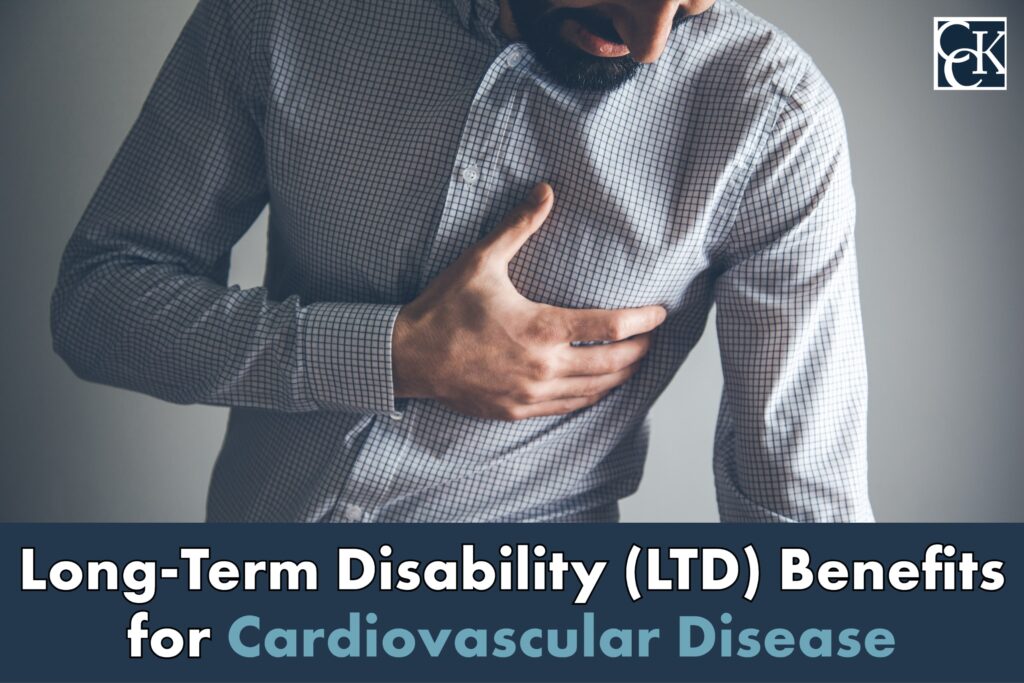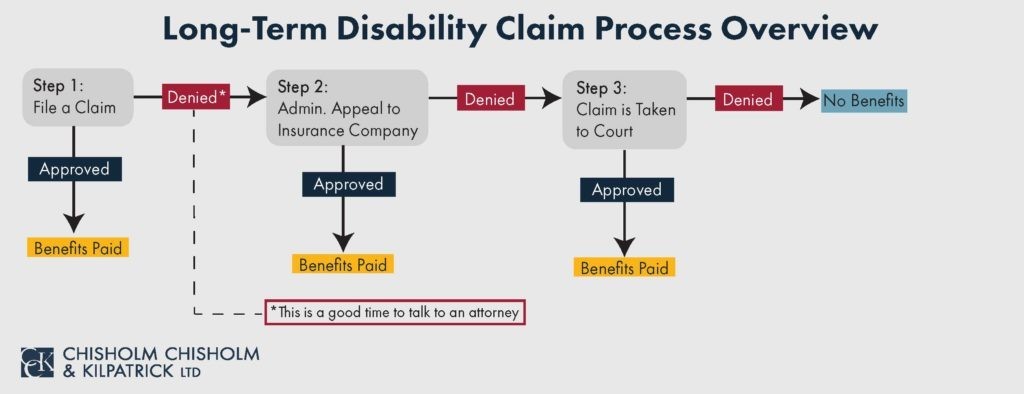Long-Term Disability (LTD) Benefits for Cardiovascular Disease

Cardiovascular disease includes many different problems with the heart and blood vessels. It can cause a variety of symptoms and result in severe complications, both of which may impact an individual’s ability to work. If you are unable to work due to your cardiovascular disease, you may be able to file a long-term disability (LTD) claim for benefits. These benefits can protect a percentage of your pre-disability earnings—typically between 60 and 80 percent.
However, obtaining such benefits can be difficult. Insurance companies deny long-term disability insurance claims every year, even for conditions such as cardiovascular disease. This article will address why different cardiovascular diseases may require filing for LTD benefits and what individuals can expect when filing for benefits.
Understanding Cardiovascular Disease
Cardiovascular disease is an umbrella term for several conditions affecting a person’s heart. Some people who have cardiovascular disease may show symptoms, but others may be asymptomatic. Nevertheless, if you begin noticing common symptoms of cardiovascular disease, then you must visit your doctor. These conditions can be serious, sometimes fatal.
Some common symptoms of cardiovascular diseases include:
- Chest pain
- Chest pressure
- Shortness of breath
- Dizziness
- Fainting
- Fatigue
Moreover, conditions that affect the blood vessels in a person’s body are also cardiovascular diseases. Symptoms of blood vessel issues can include pain in your legs when you walk, leg sores that do not get better, leg swelling, numbness in your face or a limb, and trouble talking.
Any of the symptoms mentioned above could make working difficult. However, your symptoms will vary based on your specific cardiovascular disease.
Types of Cardiovascular Disease
There are myriad types of cardiovascular diseases. Each of these conditions affects different parts of the heart and blood vessels. Before filing for long-term disability benefits, it is important to receive an official diagnosis from your doctor. Moreover, any diagnostic tests your doctor may use to diagnose you—such as blood work or MRI scans—can strengthen your claim for benefits. Insurance companies prefer objective medical evidence, and these tests can provide your claim with such proof.

One type of cardiovascular disease is “atherosclerotic disease,” which occurs when there is a build-up of plaque on the artery walls. This causes the arteries to narrow and can reduce blood flow from the heart to the rest of the body. Symptoms of atherosclerotic disease typically do not appear until the artery is so narrow that it cannot supply adequate blood to organs or tissues. The symptoms of atherosclerotic disease vary based on which arteries are affected.
“Heart arrhythmias” are when the heart beats abnormally, whether it be too slow, too fast, or irregularly. As a result of the heart beating abnormally, the heart cannot pump blood effectively, which can impact the ability of other organs to work properly. Symptoms of arrhythmias include feeling tired, shortness of breath, chest pain, or passing out. Arrhythmias can result in several different complications, including cardiac arrest, heart attack, or stroke.
Further, “heart valve disease” occurs when one or more of your heart valves does not function properly, which can cause blood flow from the heart to the body to be disrupted. Heart valve disease can lead to complications such as heart failure, stroke, blood clots, and heart arrhythmias.
“Hypertension,” also known as high blood pressure, occurs when the force of your blood against your artery walls is too high, which can eventually cause further heart issues. Many people with hypertension do not have any symptoms at all. However, if it becomes severe, hypertension can cause shortness of breath or headaches. Typically, high blood pressure can be managed with medication and lifestyle changes.
Other cardiovascular diseases include coronary artery disease, aortic disease, congenital heart disease, and heart failure. Regardless of the type of disease you have, if you cannot perform the occupational duties of your job because of your symptoms, then you may require long-term disability benefits.
Complications from Cardiovascular Disease
When you suffer from cardiovascular disease, you are more apt to develop or experience another medical condition. These complications are often serious, and a delay in treatment could be fatal.

A heart attack, also known as a “myocardial infarction,” occurs when the blood flow to the heart is blocked. The blockage usually occurs as a result of the buildup of plaque in your arteries (atherosclerosis). Although the symptoms can vary from person to person, common signs of a heart attack include tightness or pain in your chest or arms, shortness of breath, fatigue, lightheadedness, cold sweat, or nausea. Heart attacks are serious and require immediate medical attention.
An “ischemic stroke” occurs when a blood vessel to the brain becomes blocked, often due to a blood clot or narrowing of the arteries. This prevents adequate blood flow to the brain. Ischemic strokes are the most common type of stroke. Symptoms of an ischemic stroke can include trouble speaking, numbness or weakness of the face, arms or legs, trouble seeing, headache, and trouble walking. Depending on its severity, a stroke can have serious, and potentially permanent, effects, including memory loss, difficulty talking, paralysis, and pain.
“Hemorrhagic strokes” are less common than ischemic strokes, only occurring in approximately 13% of all strokes, according to the American Stroke Association. A hemorrhagic stroke occurs when a blood vessel ruptures and leaks blood into the brain. The blood in the brain creates swelling and pressure. Despite their different causes, the symptoms and long-lasting effects of a hemorrhagic stroke are similar to those of an ischemic stroke.
Heart failure occurs when the heart muscle is weakened and unable to effectively pump enough blood to meet the body’s needs. The heart may be unable to fill with enough blood, or it may be unable to pump blood to the rest of the body with enough force. The symptoms of heart failure include shortness of breath, fatigue, and swelling in the feet, ankles, legs, and abdomen.
How Can Cardiovascular Disease Prevent a Person from Working?
Cardiovascular disease and its complications can impact your life and ability to work in different ways. For example, you may suffer fatigue or shortness of breath, which can make engaging in physical activity difficult. A stroke can result in temporary or permanent loss of the ability to walk, talk, or perform other tasks. Alternatively, you may not have any symptoms of your cardiovascular disease, but you may be at risk for a complication if you were to work in a stressful environment.

If your cardiovascular disease severely limits what activities you can perform, you may be eligible for long-term disability benefits. You will need to provide proof to the insurance company of your condition and resulting functional impairments. This may include test results showing heart abnormalities or exercise tolerance tests demonstrating that your heart does not function properly during exertion.
However, these claims can become complicated if your test results do not show anything wrong with your heart or blood vessels. Yet you may still be experiencing symptoms such as fatigue or shortness of breath. Likewise, you may have a type of cardiovascular disease but be asymptomatic, which can also create a challenging situation when filing a claim. Regardless, your condition may lead to other complications if you return to work in a stressful environment, even when you are not showing symptoms.
Can You Get Long-Term Disability for Cardiovascular Disease?
Yes, it is possible to get long-term disability benefits for cardiovascular disease. However, it can be difficult. To receive benefits, individuals must prove to their insurance company that their cardiovascular disease disables them from working under the definition of disability present in their insurance policy.
You may have a long-term disability insurance policy through your employer or directly from an insurance company. An insurance company, such as Unum, The Hartford, or Liberty Mutual may administer your policy. However, these companies often deny claims. In these situations, you should consider consulting with a long-term disability attorney who can help you file an appeal.
It is your right to appeal a denial of your claim. Under ERISA, which governs most employer-provided LTD plans, you have 180 days to file your appeal. An ERISA attorney can help you review the denial letter, request and review your claim file, collect any supplemental evidence, and submit a comprehensive appeal on your behalf.
Call Chisholm Chisholm & Kilpatrick Today for a Free Case Evaluation
Chisholm Chisholm & Kilpatrick handles complex long-term disability claims, appeals, and litigation. If you need assistance obtaining your long-term disability benefits, we may be able to help you. Our LTD attorneys have over 30 years of combined experience and understand what insurance companies look for in a successful claim. We can act as a point of contact between you and your insurer; determine, collect, and submit all evidence on your behalf; and more.
This is not a process you must do on your own. If you suffer from cardiovascular disease, then you should be focusing on your well-being. Call CCK Law today at (800) 544-9144 for a free case evaluation with a member of our team. We will analyze your case and determine if we can assist you.
About the Author
Share this Post

